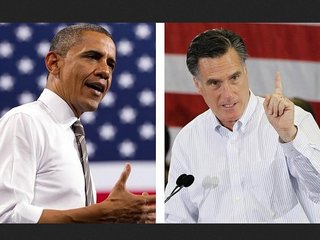
If you watched the debate last week, you probably had trouble believing the chaotic mess that was unfolding before your eyes, so you probably had your phone in-hand throughout the debacle to send texts to your friends that probably went something like: “WHAT’S GOING ON?!” and “PLS TELL ME THIS ISN’T HAPPENING!” I’m sure that’s what Chris Matthews was texting all night.
This presidential election cycle is unlike any of the ones that came before it. Never before have social media and mobile devices played such a prominent role, to the extent that the Democratic candidate kicked off his campaign on Facebook and YouTube, and the Republican candidate announced his running-mate via his mobile app.
We’ve previously looked at the way in which social media is shaping the election, but how prominent a role is mobile playing this election? Pew researchers released a study Tuesday that examined that very question, with a specific focus on cell phones and smartphones, and found that phones are playing an interesting role in keeping people informed and involved this time around.
Fully 88% of registered voters own cell phones and 48% own a smartphone, which is slightly higher than the general population, which stands at 85% and 45% respectively. Researchers found that both Democrats and Republicans are equally likely to own a cell phone or a smartphone and use text messaging, but the real difference comes in how they identify their political ideology.
A full 56% of respondents who identified as liberal and 55% of those who identified as moderate said they owned a smartphone, compared to 40% of those who identified as conservative. Additionally, 81% of liberal respondents said they use text messaging, compared to 68% of conservatives.
Researchers found that 27% of registered voters who own a cell phone have used it during the election campaign to keep up with campaign news. And once again, while party affiliation didn’t make much of a difference, political ideology did, with 37% of liberal respondents saying they use their phone to keep up with political news, compared to 28% of moderates and 25% of conservatives.
This was one of the more interesting things about the debate last week (aside from Romney’s revelation that his tax plan won’t include $5 trillion in cuts. Yeah, I just went there). If you were on Twitter (which saw a record high number of political tweets related to the debate), you could see live fact checking as the candidates were delivering their grandiose platitudes and fudged numbers. That’s an enormously powerful tool to have right in your back pocket at all times.
Chances are, you were also texting during the debate. Researchers found that 19% of voters with cell phones said they’ve sent text messages related to the campaign to friends and family, and that Republicans and Democrats were equally likely to send texts. No one really likes receiving those texts, though. Only 5% said they’ve signed up to receive text messages from a candidate or political group.
Smartphones obviously offer more opportunities for mobile information gathering than cell phones. More than one-third (35%) of smartphone owners said they’ve used their smartphone to look up whether something they just heard about a candidate or campaign was true. Nearly half of smartphone owners (45%) said they’ve used their phone to read other people’s political comments on a social networking site, while 18% said they’ve posted their own comments.
For more info on the role social media has played in the election campaign so far, check out the Pew Internet & American Life’s last study.
Image source: csmonitor.com


















